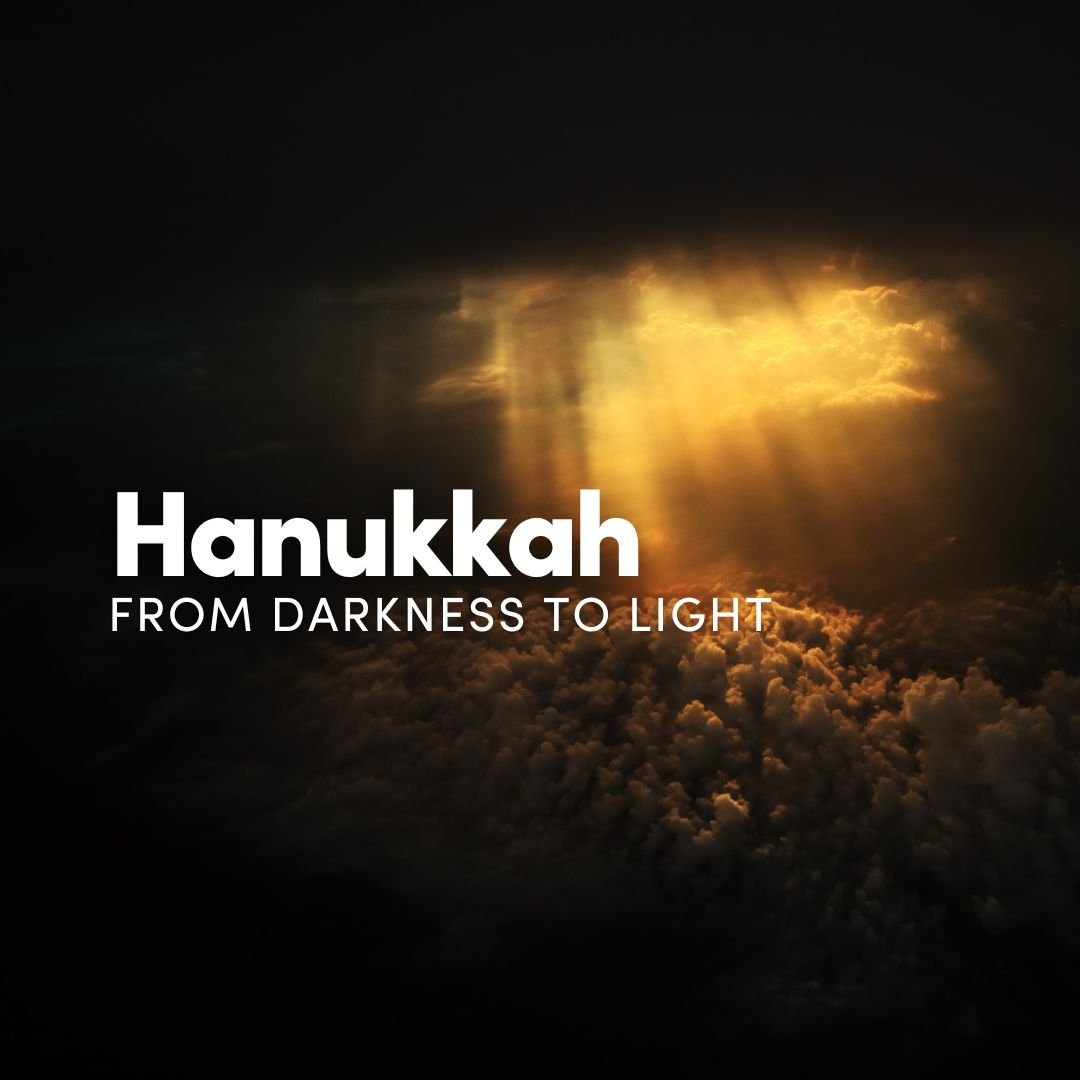Hanukkah: Darkness to Light
Hanukkah, the Festival of Dedication, begins this year (2024) at sunset on December 25. Known also as the Festival of Lights, this holiday celebrates one of the most pivotal moments in Jewish history: God’s deliverance and preservation of His people.
From Tyranny to Freedom: The Story of Hanukkah
The events of Hanukkah, taking place in 164 BCE, are a remarkable testimony to God’s faithfulness. As Isaiah proclaims:
"I will say to the prisoners, ‘Come out in freedom,’ and to those in darkness, ‘Come into the light.’” (Isaiah 49:9, NLT)
Hanukkah commemorates the victory of the Jewish people over the tyrannical rule of Antiochus IV Epiphanes, a ruler whose cruelty knew no bounds. The revolt, led by the Maccabees, was not just a fight for survival but also a battle for the sanctity of worship and the preservation of the covenant between God and His people.
The Historical Context: From Alexander to Antiochus
The story begins with Alexander the Great, whose rise to power is prophetically described in the book of Daniel:
"Then a mighty king shall arise, who shall rule with great dominion and do as he wills." (Daniel 11:3)
After Alexander’s death, his vast empire was divided among his generals, leading to centuries of conflict between the Ptolemies in Egypt and the Seleucids in Syria. By 176 BCE, Antiochus IV Epiphanes rose to power. Desiring to Hellenize the region, he sought to erase Jewish identity, banning the observance of Shabbat, Torah study, and circumcision. He desecrated the Temple by offering pigs on the altar and erecting an idol to Zeus.
The atrocities extended to every facet of Jewish life. Women who circumcised their sons were executed along with their children. Scriptures were destroyed, and even possessing them became a capital offense.
The Jewish historian Josephus writes about this period in Antiquities of the Jews:
“He [Antiochus IV] compelled the Jews to dissolve the laws of their country and to keep their infants uncircumcised, and to sacrifice swine’s flesh upon the altar.”
Antiochus IV arrogantly called himself "Epiphanes" (the visible god), but the Jews mockingly referred to him as "Epimanes" (the madman). His reign of terror plunged Jerusalem into darkness, leaving the Jewish people oppressed and desperate for deliverance.
The Rise of the Maccabees
Amid this darkness, a priest named Mattathias and his sons rose in defiance. Refusing to bow to Antiochus’ demands, Mattathias ignited a revolt. His son Judah, nicknamed "Maccabee" (meaning "hammer"), became the leader of the resistance.
The Maccabees’ victory over the Greek army, despite being outnumbered and under-resourced, was nothing short of miraculous. After three years of warfare, they reclaimed the Temple, cleansed it of pagan defilement, and rededicated it to the worship of the one true God in 164 BCE.
The Legend of the Oil
One of the most well-known aspects of Hanukkah is the miracle of the oil, a story recorded in the Talmud (Shabbat 21b).
When the Maccabees sought to relight the Temple’s Menorah, they found only one jar of consecrated oil, enough to last for just one day. Miraculously, the oil burned for eight days, the time needed to prepare new oil.
The Talmud recounts:
"On the twenty-fifth of Kislev, the days of Hanukkah are eight... when the Greeks entered the Temple, they defiled all the oils. But when the Hasmoneans defeated them, they found only one jar of oil sealed with the High Priest's seal. Though it contained enough for only one day, it miraculously burned for eight days. The following year, they established these days as a festival with songs of praise and thanksgiving."
While this story became central to rabbinic tradition centuries later, the original celebration of Hanukkah, as recorded in the Books of the Maccabees, focused on the military victory and the rededication of the Temple. There is no mention of the miracle of the oil in these early texts.
Historically, the observance of eight days may have been inspired by Sukkot, the Feast of Tabernacles, which the Jews were unable to celebrate while under siege. The connection to light likely stems from the rekindling of the Menorah, symbolizing God’s presence and the restoration of worship.
The True Miracle of Hanukkah
While the legend of the oil is beloved, the true miracle lies in God’s preservation of His covenant people. The victory of the Maccabees ensured the survival of Jewish faith and identity. Without Hanukkah, the Jewish people might not have endured, and the world would never have known the Messiah.
As one rabbi famously said, “If there was no Hanukkah, there would be no Christmas.”
Jesus and Hanukkah
The New Testament provides a fascinating connection to Hanukkah. In John 10:22-23, Jesus is seen walking in the Temple during the Feast of Dedication (Hanukkah):
"At that time the Feast of Dedication took place at Jerusalem. It was winter, and Jesus was walking in the temple, in the colonnade of Solomon."
Jesus, born into the Jewish world, celebrated this festival of light and dedication. His presence at the Temple during Hanukkah reflects His role as the ultimate light of the world and the fulfillment of God’s promises.
A Call to Rededication
The story of Hanukkah is not merely about historical events; it is a call to rededicate our lives to God. Just as the Maccabees cleansed and rededicated the Temple, we are called to examine our own "temples"—our hearts and lives—and ensure they are dedicated to God’s purposes.
The menorah, central to Hanukkah, is a powerful symbol of light piercing darkness. The prophet Isaiah foretold the coming of the ultimate light:
"The people who walked in darkness have seen a great light; those who dwelt in a land of deep darkness, on them has light shone." (Isaiah 9:2)
Hanukkah Today
In celebrating Hanukkah today, we remember that God is faithful to His covenant with Israel. As Jeremiah 31:35-37 declares:
"If this fixed order departs from before Me,” declares the Lord, “Then the offspring of Israel also will cease from being a nation before Me forever."
The story of Hanukkah is one of resilience, faith, and divine providence. It reminds us that God’s light cannot be extinguished, even in the darkest of times. As we light the menorah, let us rededicate ourselves to the Lord and shine as His witnesses in a world that desperately needs His light.
Hanukkah FAQs
1. What is Hanukkah?
Hanukkah, also known as the Festival of Lights or the Feast of Dedication, is an eight-day Jewish holiday commemorating the rededication of the Temple in Jerusalem after its defilement by Antiochus IV Epiphanes in 164 BCE.
2. Why is Hanukkah celebrated for eight days?
According to rabbinic tradition in the Talmud (Shabbat 21b), the Maccabees found only one jar of consecrated oil to light the Temple Menorah, enough for one day. Miraculously, it lasted for eight days, the time needed to prepare new oil. Some scholars also link the eight days to the delayed observance of Sukkot, which couldn’t be celebrated during the war.
3. What is the significance of lighting the menorah?
The menorah, or Hanukkiah, with its nine branches, symbolizes the miracle of the oil and serves as a reminder of God’s provision and light overcoming darkness. Each night, one additional candle is lit using the shamash (servant candle).
4. Did Jesus celebrate Hanukkah?
Yes, the New Testament records Jesus celebrating Hanukkah, referred to as the Feast of Dedication, in John 10:22-23. His presence at the Temple during this festival reflects His identity as the light of the world.
5. What foods are traditionally eaten during Hanukkah?
Hanukkah foods are often fried in oil to commemorate the miracle of the oil. Popular dishes include latkes (potato pancakes) and sufganiyot (jelly-filled donuts).
6. What is the historical significance of the Maccabees?
The Maccabees were a group of Jewish freedom fighters who led the revolt against Antiochus IV Epiphanes. Their victory ensured the survival of Jewish worship, culture, and identity.
7. Is Hanukkah a biblical holiday?
While Hanukkah is not mentioned in the Hebrew Bible, it is described in the books of 1 and 2 Maccabees, which are included in the Apocrypha. The celebration itself reflects God’s faithfulness to His covenant people.
8. What is the connection between Hanukkah and Christmas?
Hanukkah celebrates God’s preservation of the Jewish people, paving the way for the coming of the Messiah, Jesus. Without Hanukkah, the Jewish lineage and faith might not have survived, and with it, the fulfillment of messianic prophecy.
9. What does the name "Hanukkah" mean?
The Hebrew word Hanukkah means "dedication," referring to the rededication of the Temple in Jerusalem after its desecration.
10. Can Christians celebrate Hanukkah?
Yes! Many Christians choose to celebrate Hanukkah as a way to honor the Jewish roots of their faith and recognize God’s faithfulness. Jesus Himself observed Hanukkah, making it a meaningful celebration for believers in Him.
Listen to a past episode from The Jewish Road Podcast.
About The Jewish Road
At the heart of The Jewish Road lies a passion ignited by a father-son duo, Ron and Matt Davis. Our journey began with a simple yet profound desire: to bridge the gap in understanding that has kept two faith communities apart for too long. We're here to help Christians connect with the roots of their faith and for Jews to explore the life and teachings of Jesus with an open heart.
Imagine a world where every believer, be they Jewish or Christian, not only knows their faith but truly understands its origins and interconnectedness. We strive to restore the Jewish essence of the Gospel, offering insights that deepen knowledge, bolster faith, and propel the growth of the Kingdom. The narrative of faith, we believe, is a two-act play where both acts are essential for a comprehensive grasp of the story. By uniting these acts, we're presenting a more holistic and enriching perspective.
Life is too short to wander without knowing the full essence of your beliefs. Whether you're attending a synagogue or a church, there's so much more to discover. The Jewish Road is here to guide, enlighten, and, most importantly, bring both halves of the story together. Join us on this journey; together





